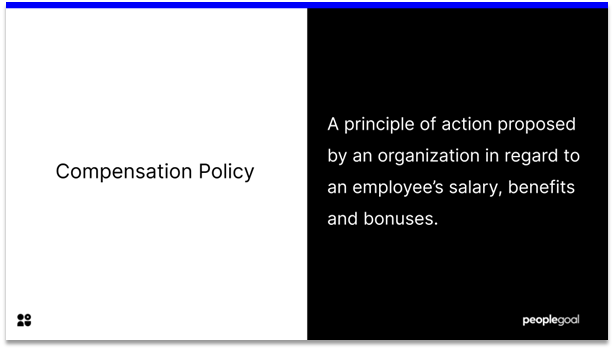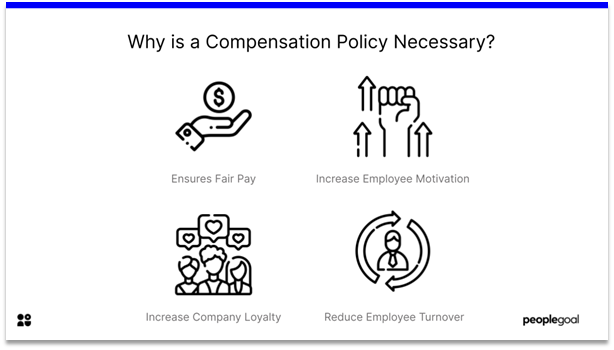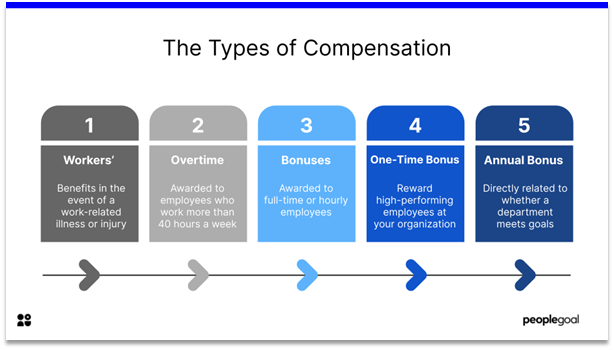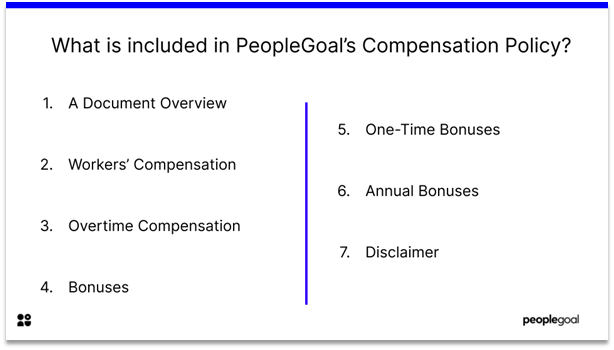Compensation Policy
The PeopleGoal Compensation Policy describes terms for workers’ compensation, overtime compensation, and bonuses. Simply adjust the information in the brackets to suit your company’s needs.
The PeopleGoal Compensation Policy describes terms for workers’ compensation, overtime compensation, and bonuses. Simply adjust the information in the brackets to suit your company’s needs.
What is a Compensation Policy?
A compensation policy is a principle of action proposed by an organization in regard to an employee's salary, benefits and bonuses.
There are many different forms of compensation and each is subject to differing state laws and regulations, in addition to the company's culture and insurance policies.

Why is a Compensation Policy Necessary?
First and foremost, a compensation policy is necessary for organizations to ensure that employees are being paid fairly. Under federal law, the minimum wage is $7.25 and employers use their policies to explain how they abide to this. In 2018, 23% of employees were unsure if they were being paid fairly.
Secondly, compensation polices can be used to increase employee motivation. The promise of rewards and recognition for high-performing employees encourages people to work harder to meet both personal and company goals and objectives.
Effective and fair compensation also enrichens your company culture. Employees are more likely to recommend working for your organization. This may further increase company loyalty and reduce your employee turnover.

What are the different types of Compensation?
There are five main forms of compensation:
- Workers' Compensation pays for employee medical expenses and partial payment of salary if there is a work-related illness or accident. The amount of benefits payable to an employee is determined by the severity of their illness or injury.
- Overtime Compensation is awarded to employees who work more than 40 hours a week. On a regular day, this is around one and a half times the regular rate of pay. On holidays or weekends, this increases to two times an employee's regular rate of pay. Some employees are exempt from overtime pay because of the nature of their work and others have a cap on weekly overtime hours.
- Bonuses can be awarded to full-time or hourly employees. Discretionary bonuses are not guaranteed, whereas non-discretionary bonuses are guaranteed by a company. All are subject to local, state, and federal laws and taxes.
- One-Time bonuses are awarded to high-performing employees. These employees perform additional duties, set positive examples for others, and regularly exceed company goals and objectives.
- Annual bonuses are awarded to full-time employees if a company exceeds their financial targets for the quarter. The year-end bonus is directly linked to the department an employee works in. Employees in departments who did not meet targets receive a 3% bonus. Employees in departments who met but did not exceed targets receive a 5% bonus. Finally, employees in departments who exceed financial targets receive a bonus of 10%.

What is included in our Compensation Policy?
The PeopleGoal Compensation Policy includes:
- A Document Overview
- Workers’ Compensation
- Overtime Compensation
- Bonuses
- One-Time Bonuses
- Annual Bonuses
- Disclaimer
The PeopleGoal Compensation Policy describes terms for workers’ compensation, overtime compensation, and bonuses. Download our policy and simply adjust the information in the brackets to suit your company’s needs.

Disclaimer: The PeopleGoal Policies are general templates and should only be used as a basis for company policies. Please take into account all local, state, and federal laws when drafting your company’s final policies. This is not a legal document or a contract, and PeopleGoal will not assume any legal liability associated with the use of this document.